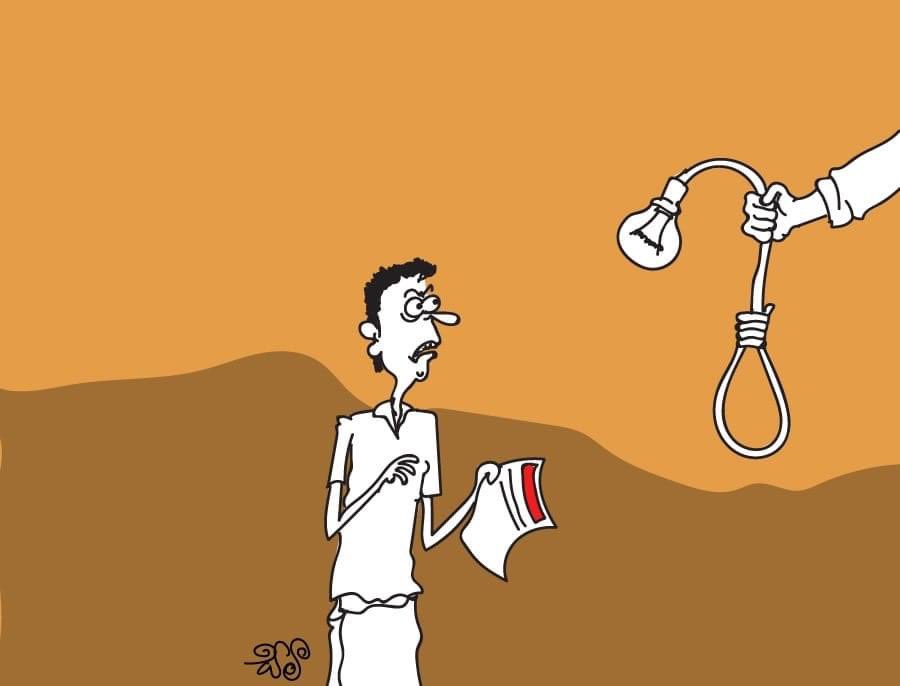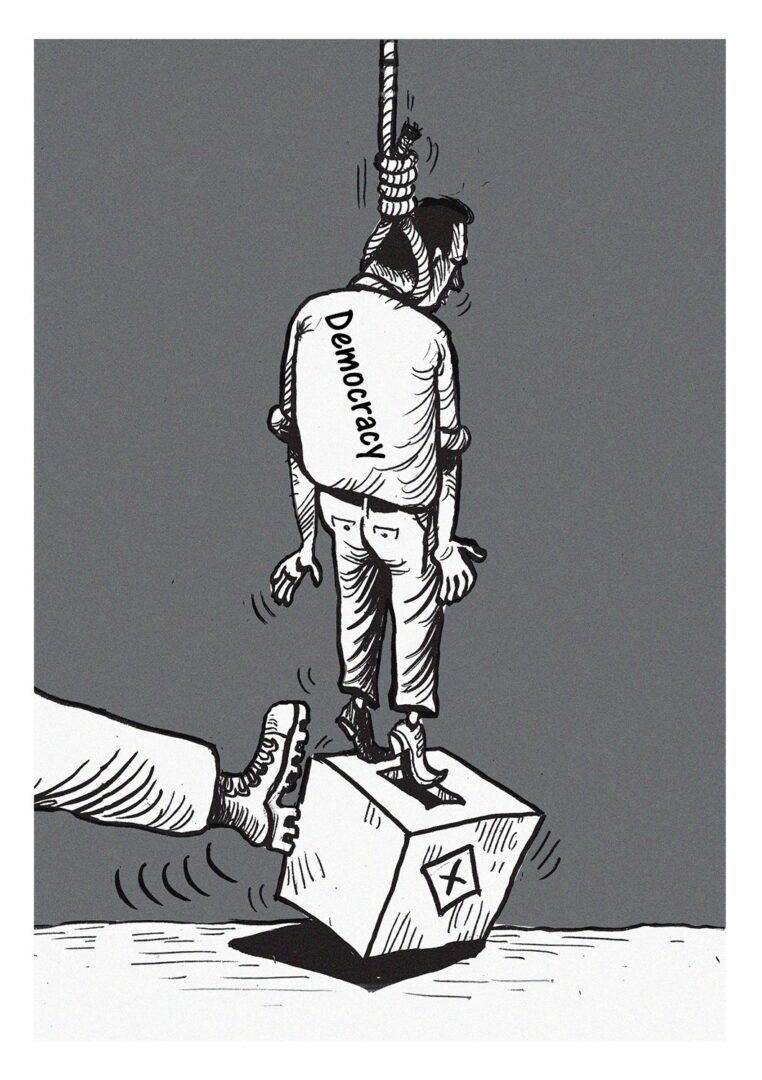 by A, Nillanthan, February 25, 2023
by A, Nillanthan, February 25, 2023
[translated from the original Tamil by Google Translate, with some improvement by the Editor.]
The power cuts have been stopped since the 16th, but the electricity bill has increased by 66 percent. What does the government want to convey to the people through this? Stopping power cuts means you have to bear the cost of rising electricity bills. In its practical sense, reducing electricity bills means consuming less electricity. The government also introduced such a strategy in fuel distribution. The QR code system is a way to control fuel consumption. It relatively curbed fuel hoarding and excessive consumption. As a result the number of dollars going out is also reduced. Now the electricity tariff has increased; the poor are the most affected by the increase in electricity tariff, while the lower middle class who use a certain limited number of power units will also be affected by this new power tariff hike. Can we also assume that the government is cunningly cutting subsidies?
On the 20th in Kandy, the President openly stated, “The government started negotiations with the International Monetary Fund last August. Accordingly, an agreement was reached at the official level in September. They proposed fifteen points for us to implement. The International Monetary Fund has given time to implement them before December 31. But we could not do it that day. Then we took steps to get time till January 31. Even then we could not complete those 15 items. Finally, the deadline was extended till 15th February. We completed all the matters by 6 pm on 15th February and sent them to Washington…”
 That is, the text shows that he is working towards the sole objective of accepting or meeting the IMF’s conditions. What will the IMF ask? Cut subsidies; privatize; raise taxes; do layoffs and stuff like that? The government has started complying with the IMF’s conditionality, so the government expects to get help from the IMF by March, but it will be a small amount and it will not be able to pay off the debt. However, it will help in recognizing the country’s borrowing capacity. This – in more pointed terms – will increase the tendency to beg.
That is, the text shows that he is working towards the sole objective of accepting or meeting the IMF’s conditions. What will the IMF ask? Cut subsidies; privatize; raise taxes; do layoffs and stuff like that? The government has started complying with the IMF’s conditionality, so the government expects to get help from the IMF by March, but it will be a small amount and it will not be able to pay off the debt. However, it will help in recognizing the country’s borrowing capacity. This – in more pointed terms – will increase the tendency to beg.
Ranil Wickramasinghe believes that if the economy can be raised to a higher level by begging, then as a result, he can win the next presidential election. As in Vadivelu’s case, it is seen that local council elections will come but not come. Opposition parties often accuse the government of planning to hold a presidential election first. If the economy recovers somewhat, the country will have no choice but to field Ranil in the next presidential election. Sajith Premadasa has yet to prove his leadership. Whether the JVP emerges as a mainstream party will be decided by the upcoming elections. However, if Ranil is proven to have the power to revive the economy, he will be the next president.
 Last Tuesday midnight his authority was further consolidated. He now has the power to dissolve Parliament under Article 70(1)a of the Constitution. In terms of its consequences, the Lotus Bud Party, which holds the majority in Parliament, will now become more subservient to Ranil. This means that Ranil has become stronger. Thus, if Ranil conducts the local council elections in a relatively strengthened environment, it may disturb some of the political stability of the job. It is expected that the results of the local council elections will be mostly unfavorable to the Lotus Bud Party. The election may prove that the two-thirds majority won by the Lotus Bud Party in the last general election has lapsed. It will disturb the political stability of the country. Without political stability, it is difficult to stabilize the economy. In the absence of political stability, Western financial institutions such as the IMF will not provide assistance. So political stability should be maintained. It is not wise to hold local council elections for that.
Last Tuesday midnight his authority was further consolidated. He now has the power to dissolve Parliament under Article 70(1)a of the Constitution. In terms of its consequences, the Lotus Bud Party, which holds the majority in Parliament, will now become more subservient to Ranil. This means that Ranil has become stronger. Thus, if Ranil conducts the local council elections in a relatively strengthened environment, it may disturb some of the political stability of the job. It is expected that the results of the local council elections will be mostly unfavorable to the Lotus Bud Party. The election may prove that the two-thirds majority won by the Lotus Bud Party in the last general election has lapsed. It will disturb the political stability of the country. Without political stability, it is difficult to stabilize the economy. In the absence of political stability, Western financial institutions such as the IMF will not provide assistance. So political stability should be maintained. It is not wise to hold local council elections for that.
A question arises at this point. Local council elections reflect local conditions. Do they show the success and failure of the parties at the national level? It is true. The local council elections reflect aspects like caste, religion and personal influence found in the locality. But finally, when the votes received by the parties are predicted at the national level, it will be interpreted as the success or failure of the parties.
Such a situation occurred after the formation of the Ranil+Maithri government in 2015. Mahinda’s team won the elections for the cooperative councils after Ranil+Maithri’s joint victory in the 2015 elections. It was a local victory. However, Ranil + Maithiri got scared and postponed the local body elections for almost 20 months. When the postponed elections were held in 2018, Mahinda’s team won. It proved that Ranil+Maithri’s joint political hold on the electorate was over and Maithri shifted his allegiance as a result. A Yapuch was involved in a coup d’état.
Therefore, even if the local government elections bring out results that are more local in nature, they can be predicted as a victory or defeat for the parties at the national level. If we think on this basis, does the Lotus Bud have a mandate from the people or not? What is Sajith’s height? What is the height of the JVP? It is true that the government is reluctant to hold a local government election that can prove the strength of the opposition.
Instead, it is safer for the government to call the elections after it has substantially improved the economy or at least received a bailout from the IMF and called it a victory. That is the image the President has been building over the last several months about the assistance available from the IMF. He said go to the IMF in his first speech when he came to Parliament as a lone elephant, during the Rajapaksa era. He still says the same; he is portraying the IMF as a panacea so that he can try to garner votes by presenting it as an achievement if he successfully gets aid from the IMF.
But the question here is whether the economy will recover somewhat by next year, as the president hopes. Because, like Sri Lanka, Greece, which fell into economic crisis, changed its government seven times within five years. In Argentina, the government changed five times. Finance ministers were changed five times. What about Sri Lanka?